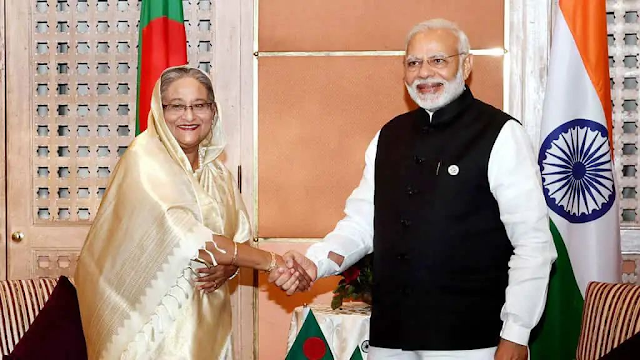SALEEM SAMAD
Bangladesh is poised for exiting least developed status and seeks new avenues with major partners in the region and beyond.
In an exclusive interview with Nikkei Asia, Bangladesh’s Prime Minister Sheikh Hasina declared that her country is discussing Free Trade Agreements (FTA) with 11 south-east Asian countries to boost trade and commerce, as the country seeks new means to promote exports once preferential tariff exemptions expire in three years.
Bangladesh has to go for a bilateral FTA for trade benefits once it becomes a middle-income country. Without FTAs, Bangladesh will lose competitive advantages over other countries – such as India, Pakistan and Vietnam, which have FTAs with a number of their trading partners.
Hasina will hold parleys with her Japanese counterpart Fumio Kishida in the last week of April. The two countries are expected to agree to upgrade bilateral ties to a strategic comprehensive partnership.
This proactive strategic diplomacy comes, when Japan ramps up infrastructure investment in the strategically situated country on the shores of the Indian Ocean, countering China’s controversial Belt and Road Initiative (BRI).
Source said Bangladesh has begun trade and economic negotiations with Brunei, Myanmar, Cambodia, Indonesia, Laos, Malaysia, the Philippines, Singapore, Thailand and Vietnam with an expectation to ink free trade agreements.
Presently, as a least developed country, Bangladesh gets duty-free market access to European Union, Canada, Australia, Japan and some other countries, reported the Financial Express published from Dhaka.
The United Nations (UN) has strongly recommended that Bangladesh sign FTAs with major trading partners like China to counter a regime without duty-free access facilities following the graduation to developing country status.
The government is now looking for ways and means to sign preferential trade agreements (PTA) with major trading partners. The preferential agreements are vital for Bangladesh to remain competitive in the international market.
Among the other countries, it has made FTA/PTA overtures to are Vietnam, Thailand, Morocco, Malaysia, the USA, Japan, Canada, Senegal, Nigeria, Kenya, South Korea, India, the Kingdom of Saudi Arabia, South Africa, Mexico, Egypt and three regional blocs – the Gulf Cooperation Council, the Eurasian Economic Commission and MERCOSUR (South American trade bloc).
The country also gets duty-free access to a range of products in the Indian and Sri Lankan markets under the South Asian Free Trade Area (SAFTA).
As key regional partners, the governments of Bangladesh and India have heightened their trade and economic cooperation at a proactive trajectory. Bangladesh has become India’s leading South Asian trading partner and the world’s fourth-largest market for Indian exports in the years 2021–2022, said economist Dr Atiur Rahman, former governor of Bangladesh Bank.
The two neighbouring countries agreed to make mutually beneficial arrangements for the use of their waterways, roadways and railways for trade and commerce between the two countries and for the passage of goods between two places in one country and to third countries through the territory of the other under the terms mutually agreed upon.
Such deals will also help Bangladesh to continue getting the duty benefits after it graduates from the league of least developed countries (LDCs). The deadline was set on September 31 this year to ink an FTA with Sri Lanka.
But unfortunately, Sri Lanka is moving very slowly. Bilateral FTAs are becoming instrumental in global trading as the prospects of multilateral trading systems under the World Trade Organisation (WTO) are gradually losing their efficacy. There are more than 200 such deals worldwide. Neighbouring India has signed many FTAs including with the Association of South East Asian Nations (ASEAN) and is trying to sign another with the European Union (EU).
Bangladesh will have to be ready and continue lobbying with the major trading partners for PTAs and FTAs as erosion of preferences will affect trade significantly at the post-graduation stage.
The country should not only try to sign FTAs but also lobby with major countries and trade blocs for signing Comprehensive Economic Partnership Agreements which include trade, tourism and investment, writes Shahid uz zaman Khan in the Financial Express.
There is no denying that the country’s future trade benefits will largely depend on bilateral free trade agreements as the country will lose duty-free facilities and a host of trade preferences once it graduates to a middle-income nation in some years.
First published in the India Narrative, New Delhi on April 22, 2023
(Saleem Samad is an award-winning independent journalist based in Bangladesh. Twitter: @saleemsamad)





